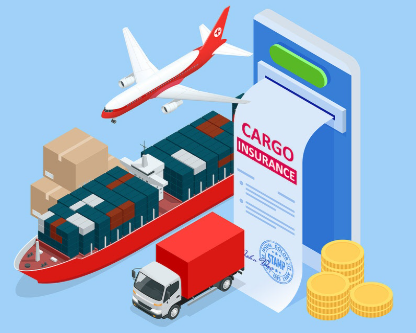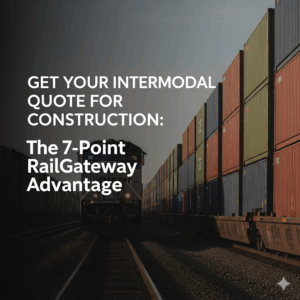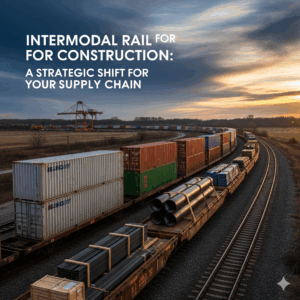Why Investing in Freight Insurance Coverage Delivers Real ROI for Your Business
In today’s fast-paced, globalized marketplace, managing freight effectively is more critical than ever for businesses of all sizes. Whether you are a manufacturer, retailer, or logistics manager, the financial health of your supply chain hinges on how well you protect your shipments. This is where freight insurance coverage plays a vital role—not just as a safety net, but as a strategic investment with powerful return on investment (ROI) benefits.
Freight insurance coverage protects your cargo against a wide range of risks, including damage, theft, loss, and delays. But beyond risk mitigation, the right freight insurance can directly contribute to your company’s bottom line by reducing unexpected costs, improving customer satisfaction, and enhancing operational efficiency. As shipping volumes increase and supply chain complexity grows in 2025, understanding the true ROI of freight insurance coverage is essential for smart shippers.

1. Avoid Crushing Financial Losses That Erode Your Margins
One damaged or lost shipment can be devastating. Whether it’s $5,000 worth of electronics or $100,000 in industrial equipment, freight insurance coverage ensures you’re not left footing the bill.
Take this real-world scenario: A shipment of HVAC systems worth $80,000 was destroyed in a derailment. The carrier’s liability? Just $2/lb—barely $6,000. With a standalone freight insurance policy, the shipper was fully reimbursed.
According to FreightWaves, carrier liability doesn’t guarantee reimbursement. That’s why third-party freight insurance coverage offers peace of mind and actual value when it matters most.
Key stat: Without full insurance, you could be exposed to losses up to 90% of your shipment’s value.
2. Keep Customers Happy with On-Time, Damage-Free Deliveries
Your customers don’t care why their product is delayed or damaged—they just want it delivered, intact and on time.
With freight insurance, your business can quickly replace or refund damaged items without financial strain. This flexibility allows you to solve problems fast and preserve customer trust.
Reliable freight insurance also minimizes negative reviews and refund disputes, which are key to maintaining your brand’s integrity on platforms like Google and Trustpilot.
3. Lower Legal Exposure and Avoid Time-Consuming Disputes
When things go wrong, you don’t want to fight it out in court. Freight carriers often have limited legal liability, and winning a claim without additional coverage can take months or even years.
Freight insurance coverage simplifies this. Your policy clearly outlines what’s protected, making it easier to file claims and get paid. That means fewer legal headaches, less paperwork, and more time spent growing your business—not managing damage control.
Pro tip: Always choose policies that include “All-Risk” freight insurance for the broadest protection.
4. Get Stronger Negotiating Power with Carriers
Carrier insurance usually only provides minimal protection. With your own freight insurance policy, you can negotiate better terms and avoid paying inflated carrier insurance premiums.
You’re also free to choose the most cost-effective lanes and carriers without worrying about coverage gaps. That kind of freedom supports better operational planning and unlocks real cost savings over time.
This is especially valuable in intermodal freight, where risks compound over multiple transit points. Learn more about intermodal shipping best practices at RailGateway.ca.
5. Build Brand Credibility and Win Repeat Business
Today’s customers demand reliability—and when you insure every shipment, they take notice.
Offering insured shipping reinforces that your business is accountable, transparent, and professional. It also opens doors to contracts that require cargo insurance as part of vendor compliance.
In industries like pharmaceuticals, electronics, or luxury goods, insured delivery is non-negotiable. Freight insurance coverage doesn’t just protect your products—it enhances your credibility and helps you win bigger clients.
The Bottom Line: Freight Insurance Coverage Pays Off
Let’s recap: With the right freight insurance policy, you can:
- Recoup losses from damaged, delayed, or stolen shipments
- Strengthen customer relationships through faster recovery
- Reduce legal and financial risks
- Improve shipping flexibility and reduce costs
- Boost your brand’s trustworthiness and professionalism
Freight insurance isn’t a cost. It’s an ROI-positive strategy to protect margins and accelerate business growth.

Frequently Asked Questions (FAQ)
What does freight insurance typically cover?
Most freight insurance policies cover loss, damage, theft, and sometimes delay. Policies vary by provider—ask about “All-Risk” options for full protection.
What’s the difference between carrier liability and freight insurance?
Carrier liability is limited and based on weight—not value. Freight insurance covers the actual declared value of your goods.
Is freight insurance required in Canada?
It’s not legally required, but highly recommended. Carriers in Canada are not obligated to pay full value on losses unless explicitly stated in the contract.
🔗 Useful Resources:
Canadian Transportation Agency: Shipping Liability Basics
FreightWaves: Understand Freight Liability
RailGateway: Intermodal Shipping in Canada
In 2025, the logistics landscape demands that businesses adopt proactive, strategic approaches to managing freight risk. Freight insurance coverage is not simply an added cost or a regulatory checkbox — it is a critical tool that drives real financial value.
From protecting your bottom line against cargo loss and damage to improving operational resilience and customer trust, the ROI of freight insurance coverage is clear and compelling. By minimizing losses, smoothing cash flow, enhancing your competitive edge, optimizing costs, and harnessing technology, your business can thrive in an unpredictable shipping environment.
Choosing the right freight insurance coverage tailored to your unique needs is an investment that pays dividends year after year. As supply chains grow more complex, let freight insurance coverage be the shield that safeguards your profits and powers your growth.
Final Thoughts: Why Freight Insurance Coverage Is the Cornerstone of Smarter Shipping in 2025
As you’ve seen throughout this guide, freight insurance coverage delivers far more than simple risk protection—it delivers strategic value that directly impacts your bottom line. In 2025, smart businesses aren’t just looking at insurance as an expense; they’re seeing it as a powerful return-generating tool. Every damaged pallet avoided, every loss mitigated, and every customer order fulfilled without delay reflects in reduced operational costs, stronger cash flow, and a brand built on reliability.
The true ROI of freight insurance coverage lies in its ability to convert unpredictable supply chain threats into manageable, measurable outcomes. Instead of dealing with surprise losses or revenue hits from delayed or damaged shipments, insured shippers can move confidently knowing they’re protected, reimbursed, and back in motion quickly. In an era when logistics are under the spotlight and customer expectations are higher than ever, this kind of financial resilience is indispensable.
Why 2025 Is the Year to Rethink Your Freight Risk Strategy
Global trade continues to face challenges from geopolitical instability, rising cargo theft, inflation, fuel price volatility, and climate-related disasters. These factors increase freight risks and make proactive mitigation more important than ever. Freight insurance coverage is not just reactive—it’s an anticipatory, data-driven measure that prepares your business to face these challenges with confidence.
Today’s shippers must integrate risk planning into their logistics operations. It’s no longer enough to assume carriers will take responsibility for damages—carrier liability is limited, restricted, and rarely adequate to cover the full value of your goods. Even in the best-case scenarios, reimbursement under carrier liability is often subject to strict documentation, lengthy timelines, and caps based on weight—not worth.
With these realities in mind, forward-thinking logistics managers and operations executives are investing in freight insurance coverage as part of a comprehensive cost-containment and continuity strategy.
Freight Insurance as a Profit Protection Tool
Let’s break down the numbers: If your average shipment is worth $50,000 and you’re sending 100 shipments a year, even a 2% damage or loss rate could cost your business $100,000 annually. That’s $100,000 off your bottom line—lost revenue, customer refunds, or write-offs. Now, contrast that with freight insurance coverage that may cost $500–$1,000 per shipment. For $50,000 in premiums, you’re protected against the full $5 million worth of cargo shipped annually.
In short, the cost of coverage is negligible compared to the financial risk of not having it. This is the essence of ROI when it comes to freight insurance: you’re not spending for the sake of safety alone—you’re securing profits, protecting your capital, and ensuring uninterrupted business operations.
Moreover, when damages do occur, you don’t absorb the loss or try to battle a carrier with limited liability. You simply file your claim, get reimbursed, and keep moving. That’s a real, tangible advantage.
Protecting Your Brand and Reputation
Today’s customers—whether B2B clients or consumers—expect flawless order fulfillment. Damaged goods, delayed shipments, or inconsistent delivery timelines affect more than your profit margins. They damage your brand equity and erode trust.
Freight insurance coverage is a silent yet powerful guardian of your brand’s reliability. When you’re insured, you’re more equipped to absorb disruptions, respond quickly, and preserve the service standards your clients expect. You can reroute, reship, or expedite replacements with confidence, knowing your insurer is covering the cost.
That translates into better reviews, stronger partnerships, and repeat business—all crucial to sustained success in 2025 and beyond.
Real ROI from Reduced Claims Complexity
Another overlooked benefit of freight insurance coverage is the simplified claims process. With traditional carrier liability, filing a claim often requires intensive documentation, back-and-forth communication, and the burden of proving carrier negligence. Even then, payouts can be minimal.
In contrast, freight insurance—especially “all-risk” policies—shifts the burden of proof away from you and covers most causes of loss, regardless of whether the carrier was at fault. This simplifies your internal process, reduces admin time, and speeds up reimbursements. Faster payouts equal less disruption, improved cash flow, and better resource planning—each a measurable contributor to your company’s operational efficiency and financial performance.
Freight Insurance Coverage Supports Scalable Growth
As your business grows, so does the complexity of your logistics. Higher shipment volumes, more valuable goods, longer routes, and tighter timelines all increase your exposure to risk. At a certain scale, freight insurance coverage isn’t just a smart decision—it’s a non-negotiable foundation for sustainable scaling.
With the right coverage in place, you can expand confidently, take on new markets, or experiment with new suppliers and routes without worrying that a single shipment mishap could derail a major contract or customer relationship.
Scalability isn’t just about sales—it’s about stability. Freight insurance gives your business the foundation to grow without introducing unnecessary volatility.
How RailGateway Helps Canadian Shippers Maximize the ROI of Freight Insurance Coverage
At RailGateway, we understand the intricate needs of Canadian shippers and how freight risk management plays into overall logistics success. We help businesses not only move freight more efficiently by rail, but also build end-to-end resilience by:
- Connecting shippers with reliable freight insurance providers tailored to the Canadian supply chain landscape.
- Helping evaluate your freight risk exposure based on cargo type, routes, and seasonal factors.
- Advising on intermodal strategies that optimize insurance premiums while maximizing cargo protection.
- Supporting claims coordination and documentation to ensure a smooth reimbursement process.
Whether you’re shipping across provinces or internationally via intermodal rail, RailGateway can help you integrate freight insurance coverage into your transportation strategy for maximum ROI.
Our goal is to ensure your freight arrives safely, your finances remain protected, and your customers stay happy.
Ready to Reclaim Lost Profits with Smarter Shipping?
If you’re still depending on carrier liability or hoping that things won’t go wrong, it’s time to take control. Freight insurance coverage is no longer optional—it’s a strategic lever that allows you to stabilize, scale, and succeed in 2025’s unpredictable shipping environment.
Don’t wait for a costly incident to reveal the cracks in your current freight protection plan. Make the proactive move today. Secure your shipments, protect your profits, and gain peace of mind knowing your cargo is covered.
RailGateway is here to help you build a shipping strategy that’s not just fast or affordable—but resilient, intelligent, and ROI-driven.
Learn more about how we can support your rail and intermodal freight goals in Canada at railgateway.ca and discover how proper freight insurance coverage can transform your logistics from vulnerable to virtually bulletproof.

FAQ
What is freight insurance coverage, and why is it important in 2025?
Freight insurance coverage is a policy that protects the shipper’s cargo against damage, theft, loss, and other transit-related risks during the shipping process. In 2025, with global supply chains facing increased volatility from climate events, cargo theft, port congestion, and geopolitical instability, this protection is more crucial than ever. It not only reduces the financial impact of shipping disruptions but also ensures business continuity and peace of mind for shippers of all sizes.
2. How does freight insurance coverage differ from carrier liability?
Carrier liability refers to the limited legal responsibility of the carrier in the event of cargo loss or damage, which is often capped based on weight or fixed rates (e.g., $2/lb in Canada). Freight insurance coverage, on the other hand, insures the full commercial value of your goods and includes broader protection—regardless of carrier fault. Relying solely on carrier liability exposes businesses to significant uncovered losses, especially when dealing with high-value or fragile shipments.
3. What types of freight insurance coverage are available to Canadian businesses?
There are several types of freight insurance policies, including all-risk coverage, named-perils coverage, and general average contributions for marine or multimodal shipments. All-risk freight insurance coverage offers the broadest protection, covering most unforeseen events unless specifically excluded. Canadian businesses can also tailor policies for intermodal, LTL, FTL, or international shipments, ensuring precise protection based on mode, route, and commodity.
4. How does freight insurance coverage contribute to a better ROI for shippers?
Freight insurance coverage delivers ROI by preventing revenue loss from damaged or lost cargo, avoiding costly disputes with carriers, and expediting replacements to meet customer expectations. By safeguarding the supply chain, it supports cash flow, protects profit margins, and strengthens client relationships. This translates into quantifiable financial benefits, such as fewer chargebacks, reduced emergency freight costs, and stronger brand loyalty.
5. Can freight insurance coverage support eCommerce and direct-to-consumer businesses?
Yes, freight insurance coverage is increasingly essential for eCommerce businesses, especially those shipping valuable or time-sensitive goods to end consumers. As customer satisfaction hinges on timely and undamaged delivery, even a single lost package can lead to negative reviews and customer churn. Insurance ensures that businesses can replace goods quickly, absorb the financial hit, and maintain brand reputation without lengthy delays or disputes.
6. Is freight insurance coverage customizable for different types of cargo and routes?
Absolutely. Shippers can customize freight insurance coverage based on the cargo’s fragility, value, packaging, transport mode, and the risk profile of the route (e.g., high-theft regions or ports prone to weather delays). This flexibility ensures that insurance costs are aligned with actual risk levels, making it both effective and cost-efficient for specialized shipping needs.
7. How can freight insurance coverage help reduce operational downtime and business disruption?
When insured cargo is lost or damaged, freight insurance coverage enables fast reimbursement or replacement, helping companies resume operations without major delays. This prevents ripple effects across the supply chain, such as production halts, out-of-stock events, or late deliveries to key clients. Businesses that insure their shipments reduce the financial and reputational costs of unforeseen interruptions.
8. Does freight insurance coverage streamline the claims process compared to carrier liability?
Yes, freight insurance coverage—especially with experienced providers—often involves a more streamlined and transparent claims process, with faster settlements and less red tape. Carrier liability claims typically involve proving negligence, waiting for investigations, and accepting limited compensation. With insurance, documentation requirements are clearer, timelines are faster, and coverage is far more comprehensive, especially for high-value freight.
9. What is the cost of freight insurance coverage relative to the value of the shipment?
Freight insurance coverage usually ranges between 0.5% to 3% of the total declared value of the cargo, depending on factors like mode of transport, destination, and cargo type. This small premium provides protection against potentially massive losses and liability, making it a high-ROI investment. When you consider the cost of a single unrecoverable shipment versus the premium, the value of coverage becomes clear.
10. How does RailGateway help shippers maximize the ROI of freight insurance coverage in Canada?
RailGateway supports Canadian shippers by integrating freight insurance coverage solutions with our intermodal and rail freight services, offering access to vetted insurance partners and customizable coverage plans. We help businesses assess risk levels, optimize shipping strategies, and ensure seamless claims support—all with the goal of reducing shipping costs and protecting profits. By combining expert logistics with proactive risk management, RailGateway empowers shippers to achieve smarter, safer, and more profitable freight movement.




